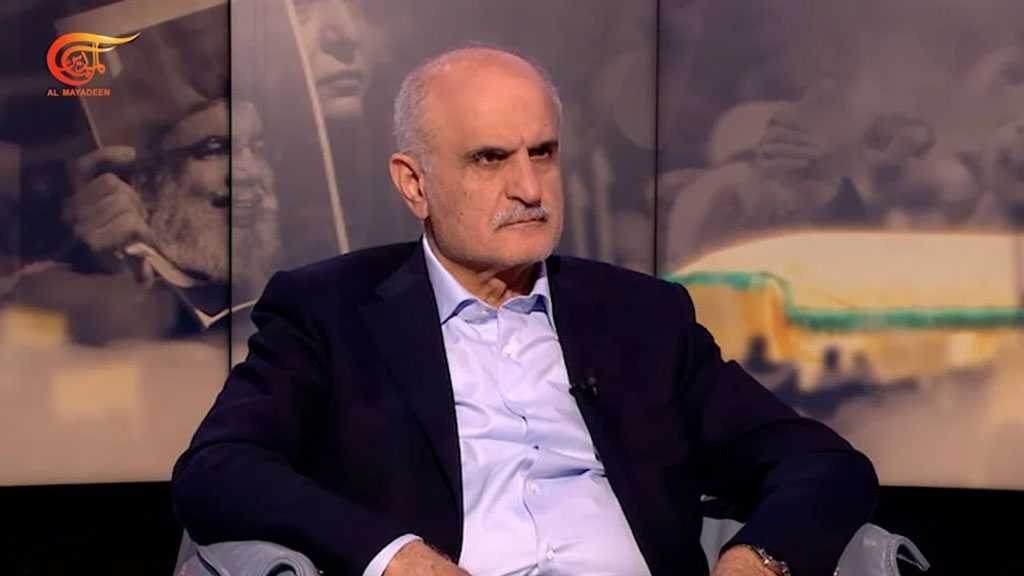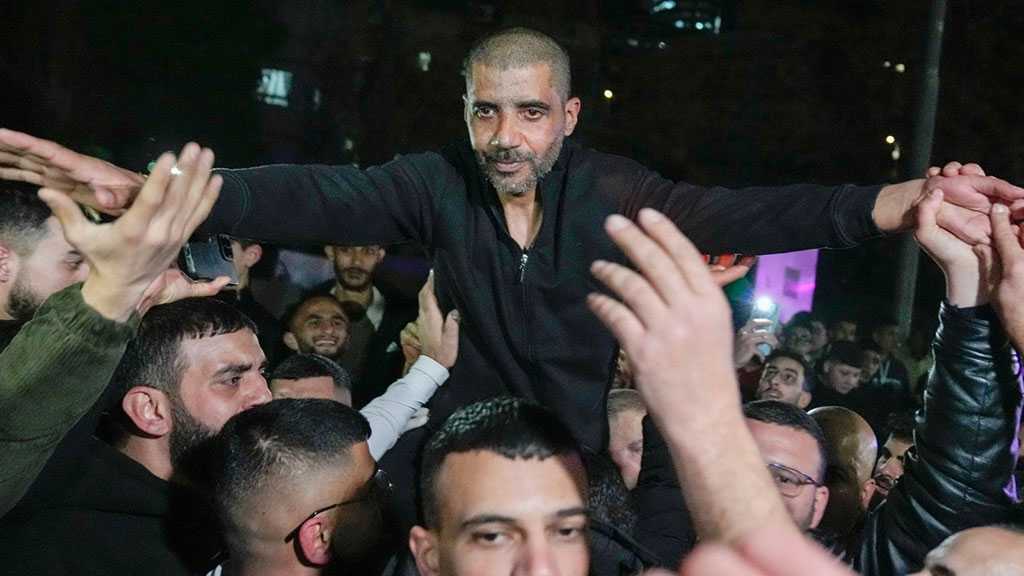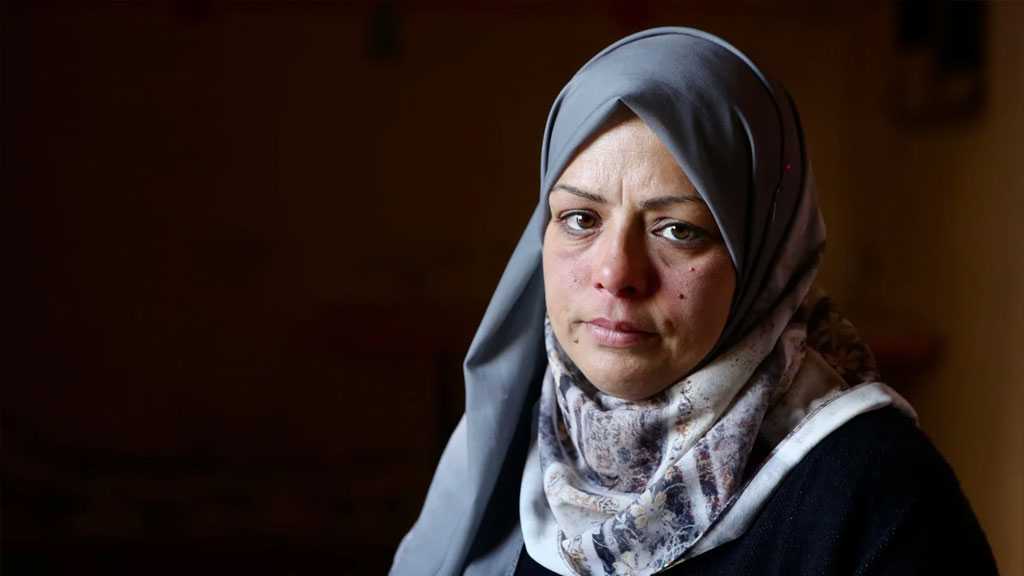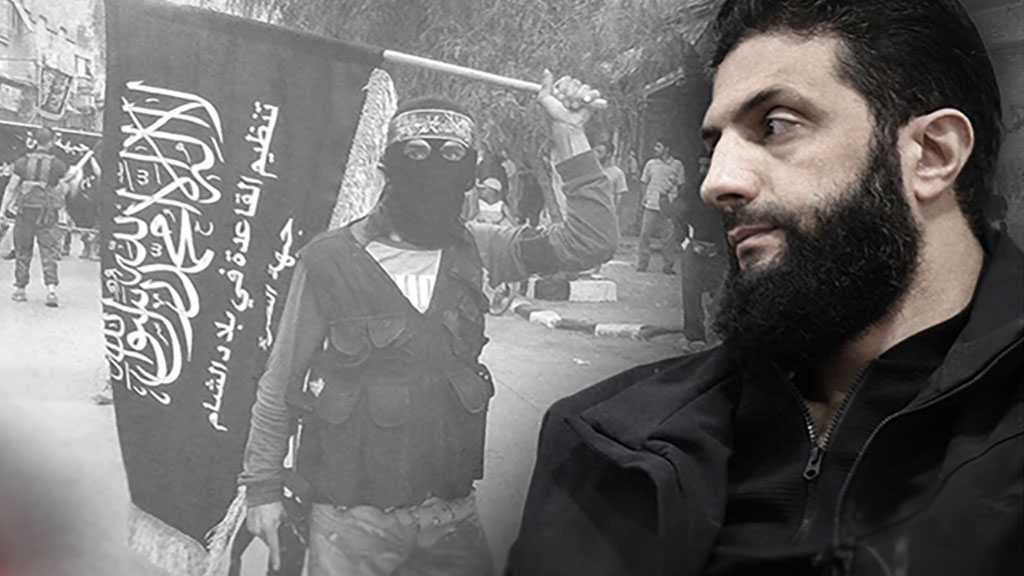
Al-Mayadeen: Ali Hassan Khalil Shares Untold Stories About Martyr Sayyed Nasrallah

By Al-Mayadeen English Website
In an interview with Al Mayadeen, political aide to the speaker of the Lebanese Parliament, Member of Parliament Ali Hassan Khalil, reflected on the profound legacy of the martyred leader, Sayyed Hassan Nasrallah, in a segment titled; "The Leader of the Nation," aired as part of the coverage regarding his funeral.
During the interview, Khalil discussed the enduring relationship between the Amal Movement and Hezbollah, as well as the personal connection between Parliament Speaker Nabih Berri and Sayyed Nasrallah. He traced the evolution of their relationship from the 1990s until the martyrdom of the leader, shedding light on the deeper personal and national dimensions of their alliance. Khalil also revealed previously unknown perspectives, providing unique insights into both the late leader's pivotal role in Lebanon's political landscape and the strategic plans that shaped the course of the nation's recent history, particularly in relation to the "Israeli" war on Lebanon.
A loss for the Nation
During the interview, Khalil emphasized that Sayyed Nasrallah’s loss "is not just a loss for a party or a specific group; it is a loss for the Amal Movement, for Hezbollah, for the Lebanese people, and for the entire nation."
He added that the Amal Movement was deeply affected by his martyrdom “because it has lost a leader and a symbol who was part of the school of the founding Imam, Sayyed Musa al-Sadr."
"He believed in this cause, fought from his position, and laid the foundation for a movement that, over time, transformed him into an icon, a role model, and an inspiration—not only within his party or organization but for all those who yearn for freedom, justice, resistance, and the rejection of oppression," Khalil told Al Mayadeen.
"We have felt a profound loss—one whose impact may not be immediately visible, but it carries immense weight," the lawmaker stressed.
Regarding the moment he received news of Sayyed Nasrallah's martyrdom and what crossed his mind at that instant, Khalil said, "Words cannot accurately convey the impression or the shock—not the initial shock, nor what followed, nor even what we are feeling at this very moment. The loss is extraordinary."
The first meeting between Sayyed Nasrallah and Berri
MP Khalil recounted his long-standing direct relationship with Sayyed Nasrallah, which began when Sayyed Nasrallah assumed the position of Secretary-General of Hezbollah in 1992. He revealed that he was present at the first-ever meeting between Berri and Sayyed Nasrallah in early March of that year.
Khalil explained that at the time, "President Berri was not directly acquainted nor had prior engaged with Sayyed Nasrallah.”
This initial meeting, he noted, "broke many barriers, particularly since the relationship between Hezbollah and the Amal Movement was in a transitional phase, requiring fresh momentum after it had been stabilized."
Berri had high expectations for Sayyed Nasrallah, hoping that he would play a key role in “strengthening the relationship between the movement and the party," Khalil said of the first-ever meeting between the two Lebanese leaders. The Lebanese Parliament Speaker expected that Hezbollah's new and young Secretary-General at the time would lead efforts in "fortifying the Shiite and Islamic spheres, and ensuring national partnership."
Khalil pointed out that the impression from that meeting “was a clear signal from the President [Berri] that we were entering a new phase."
"Sayyed Nasrallah’s approach at the time, even if not immediately understood in its full depth, was an early indication that he would evolve from being the head of a party into a leader who would transcend his movement and step onto the broader national stage," the lawmaker underlined.
An exceptional partnership
Khalil highlighted that Speaker Berri and Sayyed Nasrallah held over 50 meetings, with the initial years of Hezbollah’s martyred leader marked by frequent and routine encounters. Prior to the 2006 war on Lebanon, Sayyed Nasrallah was an active public figure, regularly participating in events that facilitated easier access for both Lebanese and international officials and personalities to engage with him.
He frequently visited President Berri, who, in turn, made reciprocal visits, Khalil added.
"Their relationship was free of formalities—there was never a question of who should visit whom; everything between them was open," he said.
However, after 2006, "President Berri insisted on being the one to visit Sayyed Nasrallah due to security considerations," Khalil explained. He recalled an instance in early 2007 when Sayyed Nasrallah expressed his intention to visit President Berri, but Berri refused and insisted that the meeting be arranged in a way that allowed him to go instead.
At the time, Berri emphasized, "What matters most is protecting and preserving Sayyed Nasrallah, as he is a partner in Resistance, a partner in public affairs, a partner in personal matters, and a partner in Lebanon’s shared concerns—those of the Lebanese, of Muslims and of Arabs, and perhaps even beyond.
On a personal level, "there was an exceptional bond, to the extent that they came to understand each other without restrictions as if any veil between them had been lifted. Whatever President Berri said, Sayyed Nasrallah understood, and vice versa. Often, their rationale aligned so naturally that they reached the same conclusions without even needing to communicate."
Khalil also pointed out that "every meeting with Sayyed Nasrallah took place above ground, in standard locations—always on the fourth, fifth, or sixth floors of buildings."
Regarding Sayyed Nasrallah’s habit of referring to Berri as "the elder brother" and the deep, unwavering trust between them as leaders of Hezbollah and the Amal Movement, Khalil stated that "Sayyed Nasrallah’s stance toward Amal precisely reflects the essence of their relationship, which was fundamentally built on the vision of Imam Musa al-Sadr and cemented by an exceptional level of trust between the two men—one that extended beyond leadership structures."
The relationship between Sayyed Nasrallah and President Berri "serves as a lesson for future generations," he emphasized.
"It demonstrates how two entities, initially different in approach, can move beyond past tensions, build a relationship based on cooperation and alliance, and ultimately reach a point where there was not a single political issue in the past 15 years where one took a stance opposed to the other," Khalil underscored.
"This should stand as an example of how two prominent figures, like President Berri and Sayyed Nasrallah, can transform political direction, public sentiment, and strategic vision into a unified and harmonious partnership," the lawmaker concluded.
A distinctive personality
Regarding Sayyed Nasrallah’s character, MP Ali Hassan Khalil described him as "a distinguished figure—exemplary in ethics, respect, humility, and his deep appreciation for others, regardless of who they were, particularly in his relationship with President Berri."
Khalil recounted an anecdote that illustrated this dynamic: "Sayyed Nasrallah rarely—almost never—ate raw meat, whereas President Berri, following the southern Lebanese tradition, was accustomed to 'frakeh' [a finely minced raw meat dish]. One day, Berri insisted that Sayyed Nasrallah try it. He did, and to his surprise, he enjoyed it—just like most Southerners and many Lebanese. From that moment on, it became a staple dish at Sayyed Nasrallah’s table, even when he was the one hosting."
Reflecting further on Sayyed Nasrallah’s personality, Khalil recalled a pivotal meeting in 2015 that he attended alongside Berri, former Lebanese President Michel Aoun, and Marada Movement leader Sleiman Frangieh, in the presence of Sayyed Nasrallah. The discussions revolved around the Lebanese presidential elections at the time.
"During that meeting, Sayyed Nasrallah was keen on breaking any lingering barriers between President Berri and General Aoun. The conversation was remarkably candid, and Sayyed Nasrallah played the role of mediator—carefully ensuring that neither party felt alienated while working to reconcile their differences."
According to Khalil, "that meeting laid the foundation for the political positioning regarding the 2016 presidential election. While there were significant differences, it was a defining moment in shaping the choices that followed."
Sayyed Nasrallah’s relationship with political figures
Regarding Sayyed Hassan Nasrallah’s trusted allies, Khalil noted, "There was a special fondness for Sleiman Frangieh and a very warm and affectionate sentiment toward General Michel Aoun."
Khalil emphasized that Sayyed Nasrallah "was remarkably open to political relationships and highly personable in his approach."
"He always sought to build direct connections, whether with Prime Minister Rafik Hariri or various political figures over the years," Khalil revealed.
"He made time for these relationships and never treated meetings as mere formalities. Even in official settings at Hezbollah’s Secretariat, he would dedicate ample time to discussions, often steering conversations toward personal matters and broader topics," the lawmaker told Al Mayadeen.
As for Sayyed Nasrallah’s relationship with former Progressive Socialist Party leader Walid Jumblatt, Khalil explained that "there were many differences between them, yet Sayyed Nasrallah always maintained respect and a degree of cordiality."
"Even at times of heightened tensions between Hezbollah and the Progressive Socialist Party, or in moments of direct disagreement with Jumblatt, Sayyed Nasrallah would insist that the relationship should always be preserved," Khalil explained.
Behind the scenes of Sayyed Nasrallah’s Victory Speech in 2006
Regarding his last in-person meeting with Sayyed Hassan Nasrallah, MP Ali Hassan Khalil revealed that it took place more than three years ago. However, he stressed that "communication was never cut off," noting that he had spoken with him less than four days before his assassination.
Khalil then recalled a particularly vivid memory—the first meeting between Sayyed Nasrallah and Speaker Nabih Berri after the 2006 July War.
"Neither of them said a word at first. They simply embraced and remained in that embrace for about a minute, holding onto each other without speaking. President Berri then placed his shoulder against Sayyed Nasrallah’s, and they walked inside together," the high-ranking Amal official said.
The meeting, Khalil noted, "took place in a building’s third floor, surrounded by the rubble of destroyed buildings."
Describing the moment, Khalil said, "I was frozen in place. It was an overwhelming display of deep brotherhood, longing, and shared triumph."
"It reflected the true value of the unity and coordination that had brought them to that moment," he asserted.
At that time, Sayyed Nasrallah was preparing for the victory celebration scheduled for the following day. He turned to Berri and said:
"Abu Mustafa, I want to ask you something. The brothers are advising me not to appear at the rally."
Berri responded, "I agree with them, Sayyed. We are facing a treacherous enemy, one that has no values and respects no commitments. I beg you, safeguard your life. We cannot take risks with this."
However, Sayyed Nasrallah insisted:
"I have to go down. I cannot hide while all these people are coming to hear me and celebrate our victory. How can I not address them? Even if it’s just for five minutes, I will stand before them."
And so, he did. Sayyed Nasrallah descended into the crowd and delivered his historic speech in front of thousands of the Resistance's supporters, in which he famously declared:
"O most honorable people, O purest people."
Read more: Palestine remains loyal to Sayyed Nasrallah's sacrifices: Abp. Hanna
Berri's reactions to Sayyed's martyrdom
Regarding Speaker Berri’s reaction to Sayyed Nasrallah’s assassination, MP Ali Hassan Khalil revealed that he was among those who confirmed the news, along with Ahmad Baalbaki.
"At that moment, he stood behind his desk, lifted his head, then lowered it. He choked up and couldn’t express himself in any way. I felt that he wanted to cry. So, Baalbaki and I quietly stepped out, closed the door, and left him alone," Khalil recounted.
Five minutes later, they re-entered the room. Berri, still overwhelmed, told them:
"We have lost a part of ourselves, and I have lost a part of me. I don’t know how I will adapt to this."
Impact on the Resistance
Addressing the implications of Sayyed Nasrallah’s assassination and the "Israeli" targeting of key military leaders, Khalil acknowledged:
"We cannot downplay the sense of disruption and anxiety that arises from losing someone like Sayyed Nasrallah—he was at the core of the Axis, the pillar of this immense role he played within Hezbollah," he underlined.
"Personally, I felt like we were facing an earthquake, and President Berri shared this same assessment," he added.
Days later, Khalil recounted, "we were informed that Sayyed Hashem Safieddine had been elected as Secretary-General, though this was not publicly announced at the time. We all had to gather ourselves, accept the new reality, and put aside the deeply personal grief of losing Sayyed Nasrallah to focus on the battle ahead and its new dynamics."
However, tragedy struck again.
"Unfortunately, Sayyed Hashem was also assassinated days later, further complicating the situation, making it exponentially more difficult over time."
Despite these grave losses, Khalil emphasized:
"The party managed to regenerate its leadership, maintain channels of communication, and ensure that the mechanisms of political coordination between us and them remained intact—despite the extraordinary obstacles imposed by this war," the lawmaker acknowledged.
We are not in crisis, nor defeated
As part of the interview, Khalil also discussed the intended implications for the "Israeli" aggression on Lebanon.
"What happened in this war aimed to alter the entire political reality in Lebanon—internally, in terms of its interaction with the enemy, and through the influence it would have on the region. It sought a fundamental, structural change in Lebanon and the region as a whole," the lawmaker said.
The Lebanese MP clarified that the "Israeli" objective was "clear."
"The targeting went far beyond deterrence, as has been claimed. There was a project that was struck, a project that is still ongoing," he stated.
He pointed out that, "The 'Israeli' enemy’s presence at five points is an indication that it intends to continue to exert further pressure and blackmail Lebanon to leverage this situation politically, either in future arrangements or by influencing internal political movements."
Concerning the Shiite community’s current fear of marginalization in Lebanon, Khalil emphasized the community's ability to overcome adversity.
"Some believe today that the events of the war can be used to influence internal politics, but we are a community that does not feel fear or anxiety. We are not a defeated community. Rather, we are an established community with a national role, working always according to the principle of Imam Musa al-Sadr, which asserts that the strength of any sect or community must serve Lebanon—Lebanon as a whole," he stressed.
"Just as we defended Lebanon militarily, we are now a component of the political and administrative institutions of the country, and we do not feel we are in crisis," the lawmaker explained,
"We are not in crisis, nor defeated, nor wounded as some may try to portray us. Yes, we have lost many leaders, symbols, and people, but these are sacrifices we accepted," he asserted
"We are ready now, and we call on all our partners in the nation to exemplify openness toward one another to reforge the strength and resilience of this country," he concluded.


